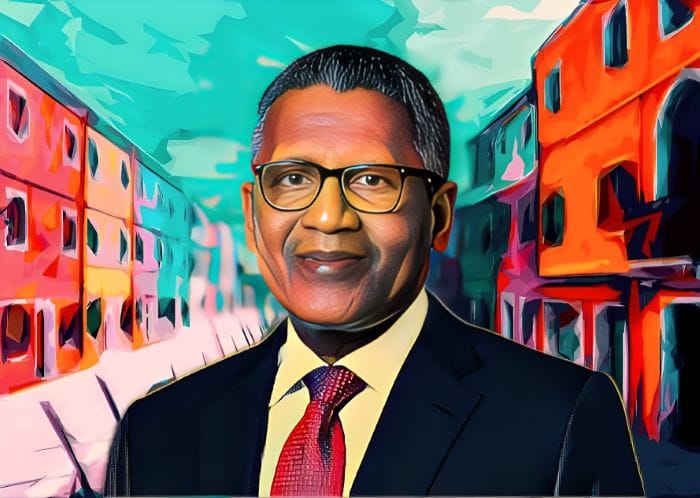Key Points
- Before building factories, Dangote dominated Nigeria’s essential commodities trade, mastering the country’s supply chain in a volatile post-independence economy.
- Dangote expanded from trading rice, sugar, and cement to founding Africa’s largest cement producer and reshaping Nigeria’s industrial and manufacturing landscape.
- His ventures slashed Nigeria’s import reliance, strengthened domestic supply chains, and set the foundation for energy independence with his $19 billion refinery project.
Long before Aliko Dangote became Africa’s richest man — before his name became shorthand for industrial might — he was mastering a simpler game: trading essential commodities, one truckload at a time. In the late 1970s and early 1980s, before the cement plants, sugar refineries, and oil ventures, Dangote quietly built control over Nigeria’s supply chains. It was patient, deliberate work that laid the foundation for one of Africa’s greatest business empires.
Born April 10, 1957, into a prominent business family in Kano, northern Nigeria, Dangote inherited an entrepreneurial spirit shaped by his great-grandfather, Alhassan Dantata, one of West Africa’s wealthiest men. After studying business at Al-Azhar University in Cairo, he returned at 21 with a loan from his uncle to start a small trading firm.
Importing rice, sugar, and cement, Dangote quickly expanded his operations, building a logistics network few could match. In a country where supply chains were notoriously unreliable, his command of distribution gave him a crucial edge. This quiet trading dominance became the springboard for his bold shift into manufacturing in the 1990s and 2000s — the industries that would ultimately seal his legacy as Africa’s business titan.
Business empire born from trading roots
In the late 1970s, as post-independence optimism surged through Nigeria, Aliko Dangote saw opportunity where others saw risk. Backed by a loan from his uncle and relentless ambition, he founded the Dangote Group in 1977—a modest trading firm importing rice, sugar, and cement. Trade was more than business for Dangote; it was heritage. Generations of family commerce in Kano had instilled in him a natural instinct for scale and dominance.
Dangote’s ventures quickly took off. By supplying staples to the booming Lagos market, he became indispensable to both companies and government agencies. His strategy was simple: control supply, cut costs, and own distribution.
While others faltered amid Nigeria’s failing infrastructure, Dangote pressed forward. In the early 1990s, he pivoted to manufacturing, investing heavily in local production. Building Africa’s largest sugar refinery and the massive Obajana Cement Plant—the group’s flagship plant with a capacity of 16.25 million tonnes per annum across five lines, he shifted from trading goods to creating them—laying the bedrock of an industrial empire few could match.
By the 2000s, Dangote’s influence was unmatched. His brands fed millions, fueled construction, and became fixtures of everyday life. Banks lined up to fund his ambitions; policy often followed his lead. In 2007, Dangote Cement rose as Africa’s top producer, while his ventures in sugar, salt, and flour became national lifelines.
Throughout his ascent, the values of family trade—discipline, persistence, and belief in hard work—remained his compass, driving a journey from modest trader to Africa’s richest man.
Aliko Dangote: Architect of Nigeria’s industrial revolution
At 52, Aliko Dangote became the first Nigerian to top the Forbes Billionaires List, securing his place as Africa’s undisputed business titan. Now 68, he remains a transformative force who reshaped Nigeria’s industrial base far beyond cement.
Launching Dangote Cement in 1981, he built Africa’s largest cement producer, with annual capacity topping 51 million metric tons across 10 countries. His expansion turned Nigeria into a net exporter, slashed infrastructure costs, and fueled growth in construction, real estate, and manufacturing. Today, the cement business alone is worth N7.29 trillion($4.53 billion).
Yet Dangote’s ambitions extended beyond cement. Through NASCON Allied Industries and Dangote Sugar Refinery, he bolstered Nigeria’s food security, cutting import dependence and strengthening domestic supply chains. Dangote Sugar alone commands over 70 percent of Nigeria’s refined sugar market, powering industries from beverages to confectionery.
In 2023, he unveiled his boldest project: the $19 billion Dangote Petroleum Refinery. With a planned output of 650,000 barrels per day, it aims to end Nigeria’s reliance on fuel imports, conserve billions in foreign exchange, and reshape Africa’s energy landscape.
Today, as the founding President and CEO of Dangote Industries Limited, he oversees a powerhouse spanning cement, food, and energy—the pillars of Nigeria’s economic sovereignty. His enduring mission: industrialize Africa, reduce dependence on imports, and elevate African excellence globally.
World Bank appointment
On April 23, 2025, the World Bank appointed Dangote to its Private Sector Investment Lab, joining leaders from Bayer, Bharti Enterprises, and Hyatt Hotels.
The Lab will tackle barriers to private investment in emerging markets, focusing on regulatory certainty, political risk insurance, foreign exchange volatility, junior equity scaling, and innovative capital mobilization. Dangote hailed the appointment as “an honor,” aligning it with his drive for sustainable development and unlocking Africa’s potential.
Dangote’s philanthropy: Vision in action
Despite a fortune built on cement, sugar, salt, and oil, Aliko Dangote has always believed true legacy lies beyond business. His philanthropy, like his rise to Africa’s richest man, is intentional, expansive, and rooted in a vision to uplift millions.
Through the Dangote Foundation, he has committed hundreds of millions of dollars to healthcare, education, disaster relief, and economic empowerment across Africa. His $1.25 billion endowment in 2014 made it one of the continent’s largest private charities. His philosophy is clear: “Wealth must touch lives, transform societies, and open doors of opportunity.”
Dangote’s impact was evident during Nigeria’s Ebola battle and the COVID-19 pandemic, where his swift interventions mobilized vital resources. From building hospitals and funding nutrition programs to backing small businesses and championing girls’ education, his philanthropy is about creating lasting change.
Dangote’s story isn’t just about skyscrapers and mega-projects—it’s about a man who measures success by the lives transformed long after the spotlight fades.
Crédito: Link de origem


